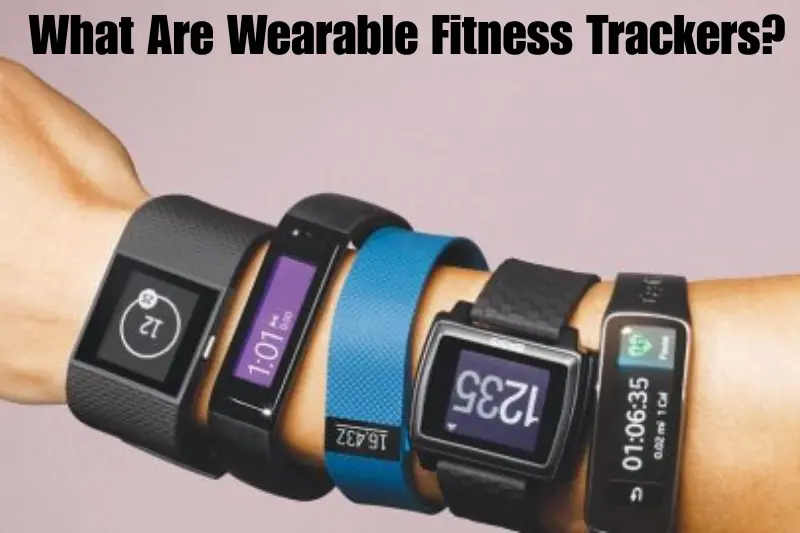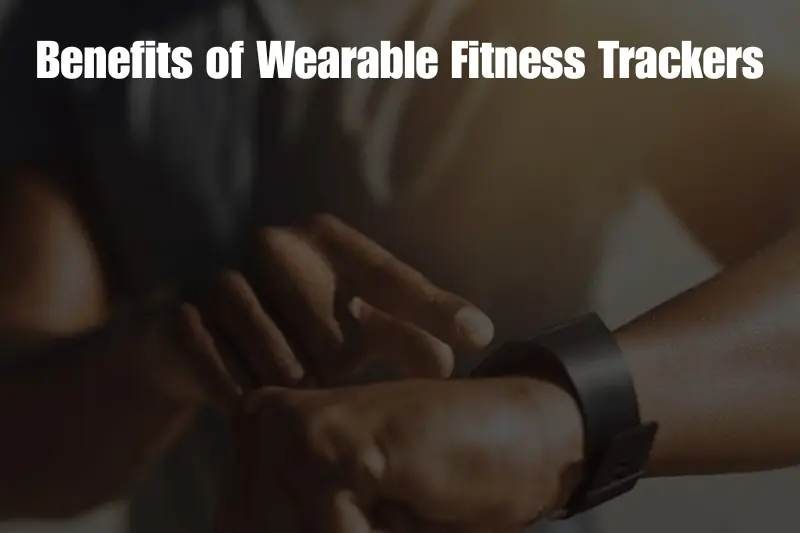Wearable fitness trackers have become indispensable tools for modern-day health management. These devices, often worn on the wrist like a smartwatch or as a fitness band, are designed to help users monitor and track various aspects of their physical activity, sleep, and overall wellness. They have evolved from simple step counters into highly advanced devices capable of tracking a broad range of health metrics, including heart rate, calorie expenditure, sleep stages, and more.
In this detailed guide, we will explore everything you need to know about wearable fitness trackers, including their features, benefits, popular models, and how to choose the right one for your personal fitness journey.
What Are Wearable Fitness Trackers?

Wearable fitness trackers are portable electronic devices worn on the body, designed to monitor a variety of health and fitness-related metrics. These trackers are equipped with sensors that capture data about your movements, biometrics, and environment. This data is then synced to mobile applications, cloud platforms, or directly onto the device, where users can track their progress, set goals, and review detailed analytics.
In addition to tracking basic activity levels like steps taken, most modern fitness trackers are capable of monitoring more advanced health metrics, including heart rate, sleep cycles, blood oxygen levels, and stress. These devices have become essential for people who want to stay on top of their health and fitness goals, whether for weight management, improving athletic performance, or simply maintaining an active lifestyle.
You may also like to read this:
Top 10 Tech Innovations Transforming Industries In 2025
Latest Technology Trends In 2025 You Should Know About
The Future Of Technology And Innovation Explained
Powerful Strength And Performance Tools For Success
Body Optimization Tech For Better Health In 2025
The Best Smart Fitness Equipment For Every Workout
Key Features of Wearable Fitness Trackers
The feature set of a wearable fitness tracker can vary widely depending on the model and the brand. However, some key features are typically found in most fitness trackers on the market today. Let’s explore these essential features in detail.
1. Activity Tracking
Activity tracking is the cornerstone of any fitness tracker. Most fitness trackers come equipped with sensors that track how many steps you take throughout the day. They also count the distance traveled, and estimate how many calories you’ve burned based on your activity level.
Some fitness trackers can distinguish between different types of activities, such as walking, running, cycling, or even swimming. By tracking daily movements, these devices encourage you to remain active throughout the day by setting step goals and providing alerts when it’s time to move.
2. Heart Rate Monitoring
Heart rate monitoring is a vital feature in fitness trackers, as it helps users understand the intensity of their workouts and overall cardiovascular health. Many trackers use optical sensors, often found on the underside of the device, to measure heart rate. These sensors detect the changes in light absorption as blood pulses through your wrist.
Some advanced trackers can monitor heart rate continuously, 24/7, to track heart rate variability (HRV), which can be an indicator of stress, recovery, and overall fitness. By tracking heart rate zones during exercise, users can optimize their workouts, ensuring they are training at the correct intensity to reach their fitness goals.
3. Sleep Monitoring
A critical part of health and fitness that is often overlooked is sleep. Wearable fitness trackers that monitor sleep help users track how well they are sleeping each night. These trackers can detect the different stages of sleep, such as light sleep, deep sleep, and REM sleep, to provide a comprehensive picture of sleep quality.
Additionally, many trackers offer insights into how long you spend in each sleep stage and how restful your sleep is. With this data, users can identify patterns or behaviors that might be negatively impacting their sleep, such as poor sleep duration or inconsistent sleep cycles.
4. GPS Tracking
GPS functionality is especially important for individuals who participate in outdoor activities like running, hiking, or cycling. Many high-end fitness trackers and smartwatches come equipped with built-in GPS, which allows users to track their route, distance, pace, and elevation without needing a smartphone.
GPS tracking can be essential for athletes or fitness enthusiasts who want to accurately measure their performance and track outdoor activities. Whether you’re training for a marathon or simply enjoying a jog in the park, GPS provides a detailed look at your activity in real time.
5. Smart Notifications
In addition to health and fitness tracking, many wearable fitness trackers offer smart features that allow users to stay connected on the go. These smart notifications can include alerts for incoming calls, text messages, emails, calendar reminders, or app notifications. Some devices even allow users to respond to messages or answer calls directly from the fitness tracker.
This feature is particularly useful for people who want to stay connected during their workout without needing to take out their phone. It helps users stay in touch without interrupting their exercise routine.
6. Water Resistance
Water resistance is an important consideration for fitness trackers, especially for people who enjoy swimming or outdoor activities in various weather conditions. Most fitness trackers today are designed to be either water-resistant or waterproof, with ratings that indicate their ability to withstand exposure to water.
For instance, many trackers can be submerged in water up to a certain depth (measured in meters), allowing users to swim or shower with the device on. This feature ensures that your fitness tracker can withstand your daily activities without worrying about damaging the device.
7. Battery Life
Battery life is one of the most important factors to consider when selecting a fitness tracker. The battery life of a fitness tracker varies based on its features and usage. Basic trackers may last up to a week or more on a single charge, while more advanced models with GPS and continuous heart rate monitoring may require charging every two or three days.
The battery life of a tracker can be impacted by features like screen brightness, the use of GPS, or how often heart rate monitoring is active. It’s essential to choose a device with a battery life that suits your needs—whether you’re looking for a tracker that can go for days without charging or you need a device that lasts for longer, continuous activity tracking.
8. Compatibility with Apps
Wearable fitness trackers typically sync with mobile apps or cloud platforms to provide users with a deeper understanding of their data. These apps allow you to review detailed analytics, set fitness goals, track progress, and even engage with social features such as challenges and competitions.
Popular fitness tracker apps include Fitbit’s mobile app, Garmin Connect, Apple Health, and Google Fit. Compatibility with these apps is crucial, as it ensures that your data can be accessed, analyzed, and integrated with other health apps and devices.
Benefits of Wearable Fitness Trackers

Wearable fitness trackers offer a multitude of benefits, from encouraging healthier habits to providing valuable insights into your physical and mental health. Here are some of the most important benefits of using a fitness tracker.
1. Motivation to Stay Active
Fitness trackers are excellent motivational tools. They help you stay committed to your fitness goals by providing real-time data and feedback about your activity levels. By setting daily goals and tracking your progress, you can challenge yourself to meet or exceed your targets, which keeps you motivated.
Many trackers also provide reminders to move, especially if you’ve been inactive for an extended period. These subtle nudges help to ensure you don’t stay sedentary for too long, promoting a more active lifestyle.
2. Personalized Health Insights
Fitness trackers are more than just devices that count steps—they provide valuable insights into your overall health and fitness. By analyzing data such as heart rate, calories burned, and sleep patterns, these devices offer personalized recommendations on how to improve your physical health.
For instance, trackers can suggest that you increase your activity levels if your step count is low or recommend strategies to improve sleep quality if you are not getting enough restful sleep. These insights make it easier for you to adjust your habits and improve your overall well-being.
3. Tracking Long-Term Progress
Wearable fitness trackers excel at tracking long-term progress. They allow users to look at their activity, health metrics, and overall performance over time. This data can help you identify trends in your health and pinpoint areas that need improvement.
Whether you’re trying to lose weight, build endurance, or monitor your fitness goals, the long-term data helps you adjust your approach and see measurable results. It can also provide you with a sense of accomplishment when you see how far you’ve come.
4. Early Detection of Health Issues
By continuously monitoring key health indicators such as heart rate, blood oxygen levels, and sleep, wearable fitness trackers can help detect potential health issues before they become serious. For example, irregularities in heart rate, low oxygen levels, or poor sleep patterns can be indicators of underlying conditions, such as arrhythmia, sleep apnea, or respiratory issues.
Some trackers also have built-in fall detection, which can be particularly useful for elderly users or those with medical conditions that make them more prone to falls.
5. Holistic Health Tracking
Wearable fitness trackers are now able to provide a more comprehensive picture of your health. In addition to tracking physical activity, many devices can monitor mental health indicators, such as stress and relaxation levels. Through metrics like heart rate variability (HRV) and guided breathing exercises, users can better manage their stress and practice mindfulness.
This holistic approach helps users achieve a balance between their physical and mental health, which is essential for overall well-being.
Popular Fitness Tracker Brands and Models
Several brands have established themselves as leaders in the fitness tracker market. Each brand offers unique features to cater to different types of users. Here’s a look at some of the most popular fitness tracker brands:
1. Fitbit
Fitbit is one of the most recognizable names in the fitness tracker industry. They offer a wide range of trackers, from basic models like the Fitbit Inspire to more advanced models like the Fitbit Charge and Fitbit Sense, which include features such as heart rate monitoring, GPS, and skin temperature tracking.
2. Garmin
Garmin is known for producing high-performance fitness trackers and smartwatches designed for athletes and outdoor enthusiasts. The Garmin Forerunner and Garmin Fenix series come with advanced features such as GPS tracking, VO2 max measurement, multi-sport modes, and more.
3. Apple
Apple’s smartwatches, particularly the Apple Watch Series 8 and Apple Watch SE, are equipped with a wide range of fitness tracking features, including heart rate monitoring, GPS, sleep tracking, and blood oxygen measurement. These devices also provide a seamless connection with the Apple ecosystem, making them ideal for iPhone users.
4. Samsung
Samsung’s Galaxy Watch series combines fitness tracking with smart features. These devices offer heart rate monitoring, sleep tracking, and even body composition analysis, which can be beneficial for users interested in tracking muscle mass and body fat.
5. Xiaomi
Xiaomi offers budget-friendly fitness trackers with solid features. Their Mi Band series includes basic activity tracking, heart rate monitoring, and sleep tracking, making them perfect for users looking for an affordable entry-level tracker.
Choosing the Right Wearable Fitness Tracker
When selecting a wearable fitness tracker, it’s essential to consider the following factors:
- Budget: Fitness trackers come in a wide range of prices. Basic models are relatively inexpensive, while premium devices with advanced features come at a higher price.
- Features: Determine what features are most important to you. If you’re a runner, a GPS feature is essential. For general fitness, a basic model with step counting and heart rate monitoring may suffice.
- Compatibility: Ensure that the tracker is compatible with your smartphone and health apps, such as Apple Health, Google Fit, or Fitbit.
- Battery Life: Depending on your usage, choose a model with sufficient battery life for your needs. Some devices last for several days, while others may need more frequent charging.
- Style and Comfort: Fitness trackers come in various designs, from sleek and minimalist to rugged and sporty. Consider both the appearance and comfort of the device, especially if you plan to wear it daily.
Conclusion
Wearable fitness trackers have revolutionized the way we monitor and improve our health. By offering real-time feedback on physical activity, heart rate, sleep, and more, these devices empower individuals to take control of their fitness journey. Whether you’re looking to lose weight, improve your athletic performance, or simply maintain a healthy lifestyle, a fitness tracker can provide valuable insights and motivation.
By choosing the right tracker for your needs, you can unlock your full potential and enjoy the benefits of a healthier, more active life.
FAQs
1. What is a wearable fitness tracker?
A wearable fitness tracker is a device that monitors physical activity like steps, heart rate, sleep, and calories burned to help you maintain a healthy lifestyle.
2. How do fitness trackers work?
Fitness trackers use sensors (accelerometers, gyroscopes, heart rate monitors) to collect data on your movements and physiological metrics, syncing this data to a mobile app for analysis.
3. What metrics do they track?
Common metrics include steps, calories burned, heart rate, distance, sleep patterns, and active minutes. Advanced models may track blood oxygen, stress, and VO2 max.
4. Can fitness trackers monitor sleep?
Yes, most trackers monitor sleep stages (light, deep, REM) and provide insights into sleep quality.
5. How accurate are fitness trackers?
While generally reliable for steps and calories, the accuracy of heart rate, GPS, and sleep data can vary depending on the model and type of activity.


